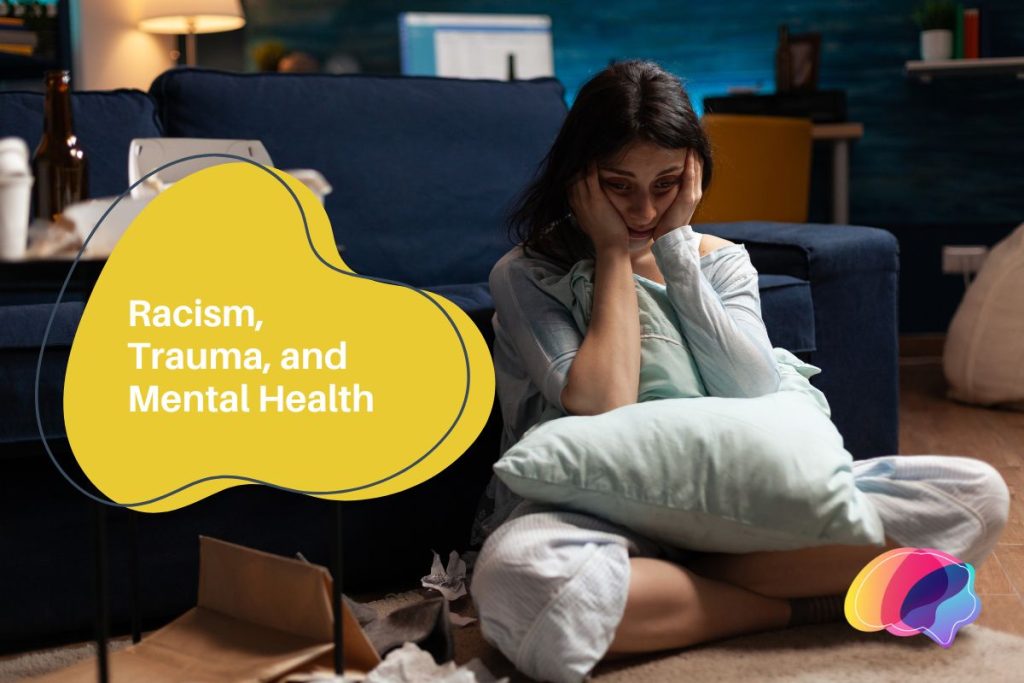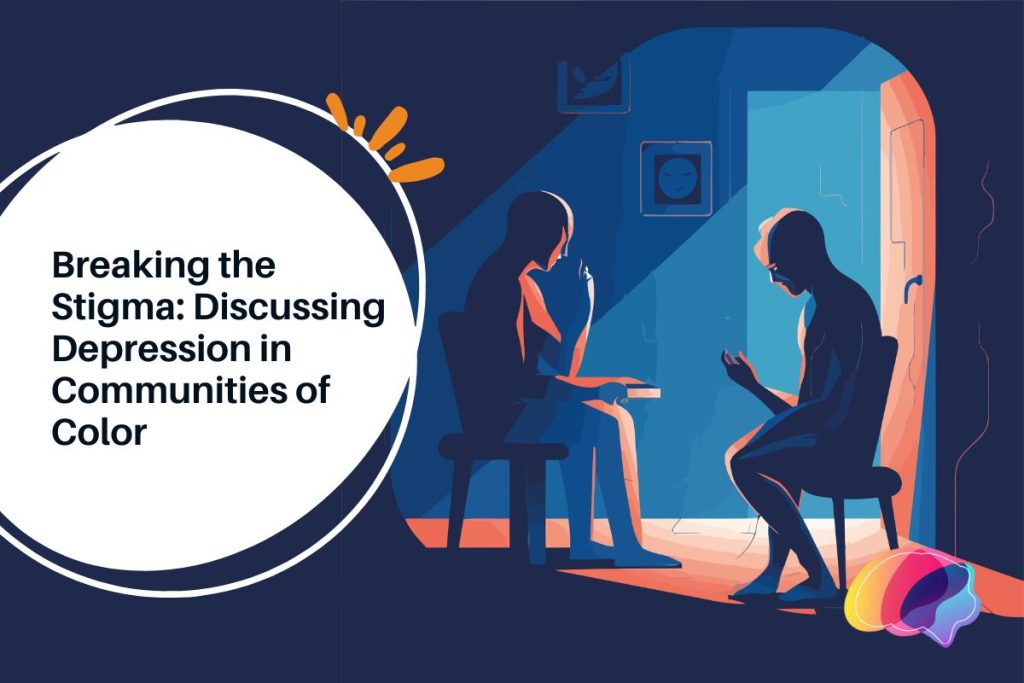Depression, a common mental health condition, affects people from all walks of life. However, it’s important to recognize that communities of color often face unique challenges when it comes to mental health.
In these communities, the impact of depression can be particularly significant, given the intersecting factors of race, culture, and systemic disparities. Understanding and addressing depression in communities of color is crucial for promoting well-being and fostering more equitable access to support and resources.
What is Depression?
Depression is a mental illness characterized by persistent feelings of sadness, loss of interest or pleasure in activities, changes in appetite or weight, sleep disturbances, fatigue, feelings of worthlessness or guilt, difficulty concentrating, and recurrent thoughts of death or suicide. It is more than just temporary sadness or a low mood; it is a persistent condition that can significantly impact a person’s daily functioning and overall quality of life.

The symptoms of depression can vary from person to person but commonly include:
Persistent feelings of sadness, emptiness, or hopelessness.
Loss of interest or pleasure in activities once enjoyed.
Significant changes in appetite, leading to weight loss or gain.
Insomnia or excessive sleeping.
Fatigue or loss of energy.
Feelings of worthlessness, guilt, or self-blame.
Difficulty concentrating, making decisions, or remembering things.
Restlessness or slowed movements and speech.
Recurrent thoughts of death or suicide, or suicide attempts.
Physical symptoms such as headaches, digestive issues, or chronic pain do not respond to treatment.
It is important to note that experiencing some symptoms does not necessarily mean someone has depression. However, suppose these symptoms persist for at least two weeks and significantly interfere with daily functioning and quality of life. In that case, it is recommended that you seek professional help for an accurate diagnosis and appropriate mental health treatment.
Racism, Trauma, and Mental Health

Racism is a deeply rooted issue that sadly persists in our society, and its impact on mental health within communities of color cannot be overstated. When individuals face racism and discrimination, it can profoundly affect their overall well-being. Mental health in the black community is a growing issue that has been studied over the years by many.
Picture this: day in and day out, people of color may encounter systemic racism, microaggressions, and prejudice, leaving them feeling marginalized and undervalued. This constant exposure to such negative experiences creates a chronic state of stress, leading to various mental health challenges like anxiety, depression, and post-traumatic stress disorder (PTSD).
The long-term behavioral health challenges Black people face stem from enduring adversities associated with the historical legacy of slavery. These include race-based exclusion from essential resources in health, education, social support, and economic opportunities. These factors have far-reaching effects on Black mental health and communities of color as a whole. Those who experience poverty, homelessness, previous incarceration, or substance use issues face a higher risk of poor mental health outcomes. Notable statistics to consider include:
Black individuals living below the poverty line are twice as likely to report serious psychological distress.
Black teenagers have a higher suicide attempt rate than their white counterparts (9.8% versus 6.1%).
Black individuals are nearly twice as likely as White individuals to receive a diagnosis of schizophrenia.
Over 25% of Black youth exposed to violence are at high risk for developing post-traumatic stress disorder (PTSD).
40% of youth in the criminal justice system and 45% of children in foster care are Black.
Transmitted Stressors: Intergenerational Trauma
Researchers have made significant progress in understanding the impact of intergenerational trauma on mental health. Intergenerational trauma refers to the transmission of trauma across generations, and emerging evidence suggests that trauma can be passed down through genetic and environmental channels.
Stress, particularly severe and chronic stress, can trigger changes in reproductive cells and the uterine environment during fetal development. These changes can have lasting effects on future generations’ physical and mental well-being. Consequently, individuals whose ancestors experienced trauma may be more susceptible to mental health conditions.
It is important to acknowledge that the effects of intergenerational trauma are not limited to those who directly experienced the trauma. Even individuals who did not directly encounter traumatic events can inherit trauma-related symptoms, such as anxiety and mood dysregulation, from their ancestors.
This knowledge has particular relevance for communities, including Black Americans, who have a history of experiencing oppression and violence. The trauma endured by previous generations can impact the mental health of their descendants, perpetuating the cycle of psychological distress.
While understanding the impact of intergenerational trauma is crucial, it is equally important to emphasize the significance of caring for one’s mental health. Recognizing the potential effects of intergenerational trauma can empower individuals to prioritize their well-being and seek appropriate support.
Barriers to Mental Health in Communities of Color
Mental health has always been a significant concern in society, affecting individuals from all walks of life. However, it is crucial to acknowledge that certain communities face unique challenges that can exacerbate mental health issues. There are some barriers that communities of color encounter regarding mental health. Let’s look at them:
Socio-economic factors
When discussing mental health disparities, it is impossible to overlook the impact of socioeconomic factors. Communities of color often experience higher poverty rates, limited access to quality education, and reduced employment opportunities, all of which can increase stress and anxiety. The financial burden that arises from these circumstances further amplifies mental health challenges. The constant struggle to make ends meet and provide for oneself and loved ones can affect emotional well-being.
Racism and bias
Racism remains unfortunate in our society, and its detrimental effects extend beyond immediate social consequences. People of color often face discrimination and bias in various aspects of their lives, including education, employment, and housing. These experiences can lead to feelings of marginalization, low self-esteem, and an increased risk of developing mental health disorders. Constant exposure to systemic racism can create a hostile and oppressive environment perpetuating mental health struggles.
Inequality of healthcare
Access to quality healthcare is a fundamental human right, yet it remains elusive for many communities of color. Disparities in healthcare access and treatment options significantly impact mental health outcomes. Limited resources, including mental health services, culturally competent care, and health insurance coverage, prevent individuals from receiving the support they need. The lack of representation and diversity among healthcare professionals can also contribute to mistrust and reluctance to seek help.
Stigma
The stigma surrounding mental health is prevalent across societies but can be particularly pronounced within communities of color. Cultural norms and taboos often discourage open discussions about mental health, resulting in silence, lack of motivation, and less mental health awareness. Many individuals fear judgment, rejection, or being seen as weak if they disclose their mental health struggles. This stigma can prevent people from seeking help, exacerbating their conditions and perpetuating the cycle of mental health disparities.
Seeking Mental Health Services in the Black Community
Seeking mental health specialists in the Black community can be a vital step towards addressing mental health concerns and promoting overall well-being. Here are some suggestions and considerations when seeking mental health support:
Overcoming stigma: Recognize that seeking help for mental health concerns is a sign of strength, not weakness. Challenge the stigma surrounding mental health within the Black community and engage in open conversations to reduce barriers to seeking support.
Seek a culturally competent mental health provider: Look for mental health professionals who have experience and understanding of the unique experiences and challenges the Black community faces. They can provide culturally sensitive care and help navigate the intersection between race, culture, and mental health.
Support networks: Connect with supportive individuals and community organizations that prioritize mental health and well-being. These networks can provide emotional support, share resources, and help reduce feelings of isolation.
Community organizations: Explore local community organizations, advocacy groups, or religious institutions that may offer mental health services, support groups, or counseling programs specifically tailored to the Black community. These organizations often understand the cultural context and can provide relevant resources.
Online resources: Utilize online platforms that provide mental health resources, directories of therapists, and support networks. Websites like Therapy for Black Girls, Black Mental Health Alliance, or the Association of Black Psychologists can help you find culturally competent therapists and access valuable information.
Insurance and affordability: Check your health insurance coverage to understand mental health benefits and reimbursement options. If insurance coverage is limited, look for low-cost or sliding-scale fee clinics, community health centers, or university counseling centers that offer affordable or discounted services.
Self-care practices: Engage in self-care activities that promote mental well-being. This may include practicing mindfulness, engaging in hobbies, maintaining a healthy lifestyle, seeking social support, and setting boundaries to manage stress effectively.
Addressing the Lack of Black Therapists

The underrepresentation of Black therapists in the mental health community is a well-documented concern supported by scientific studies. Research consistently highlights the importance of seeking therapy from professionals with similar racial and cultural backgrounds. A study found that racial and ethnic concordance between therapist and client increases treatment satisfaction and improves treatment outcomes. This is because shared racial or cultural identity fosters a sense of trust, understanding, and empathy, leading to a stronger therapeutic alliance.
Moreover, cultural competence plays a vital role in therapy. It was emphasized that therapists with cultural competence exhibit awareness, knowledge, and skills to engage with clients from diverse backgrounds effectively. Black therapists, having experienced similar racial and cultural contexts, are more likely to possess the cultural sensitivity necessary to address the unique challenges faced by Black individuals. They can provide a safe and validating space where clients’ experiences of racism, discrimination, and systemic oppression are understood, acknowledged, and appropriately addressed.
Additionally, the lack of Black therapists can contribute to barriers to accessing mental health care within communities of color. Studies have shown that racial and ethnic minorities face disparities in mental health service utilization and often encounter cultural and linguistic barriers when seeking help. Increasing the number of Black therapists makes it more likely that individuals within these communities will find mental health providers who understand their issues, reducing mental health stigma and improving the likelihood of help-seeking behaviors.
Seeking Mental Health Care
It is imperative to foster culturally sensitive and accessible mental health services, educate communities about mental health, and challenge societal norms that perpetuate stigma. Only by working together can we create an environment that supports the well-being of all individuals, regardless of their race or ethnicity. Let us strive for a future where mental health is prioritized and no one is left behind.
At Lucid Wellness Center, we believe everyone deserves to live a happy and fulfilling life, free from the debilitating effects of depression. If you or a loved one is struggling with depression, contact us today to learn more about our evidence-based approach to depression treatment.
We offer same-day and next-day appointments, and our team is always here to answer any questions you may have. Let us help you regain your hope and experience a brighter tomorrow. Call (323)792-2071 to book a session today!
Frequently Asked Questions
What is the stigma surrounding depression in communities of color?
Stigma is society’s negative attitudes, beliefs, and stereotypes toward mental health issues. In communities of color, cultural, historical, and systemic factors can contribute to the stigma around mental health, including depression. This stigma often leads to silence, shame, and barriers to seeking help.
Why is it important to address depression in communities of color?
Depression can have a profound impact on individuals and communities. By addressing depression in communities of color, we can reduce the disparities in mental health outcomes and promote overall well-being. It is essential to create safe spaces for discussions, increase awareness, and provide access to culturally competent support and resources.
What are some common misconceptions about depression in communities of color?
Several misconceptions surround depression in communities of color, including the belief that mental health issues are a sign of weakness, that seeking help is unnecessary or unimportant, or that mental health concerns are solely personal problems. It is important to debunk these misconceptions and recognize that mental health affects everyone, regardless of race or ethnicity.
How can we break the stigma surrounding depression in communities of color?
Breaking the stigma requires collective efforts. Education and awareness campaigns, community discussions, and culturally appropriate messaging can help challenge negative beliefs and foster understanding. Providing resources, promoting stories of recovery and resilience, and amplifying the voices of individuals with lived experiences can also contribute to destigmatizing depression.
Where can individuals in communities of color seek help for depression?
There are several options for seeking help, including reaching out to mental health professionals, community organizations, or support groups specializing in serving communities of color. Online-focused mental health resources, helplines, and hotlines can provide immediate support, and it may be helpful to consult with primary care physicians who can offer referrals or guidance.
How can families and communities support individuals dealing with depression in communities of color?
Families and communities play a crucial role in supporting individuals with depression. This can include fostering open and non-judgmental conversations, providing emotional support, encouraging help-seeking behaviors, and promoting self-care practices. Educating oneself about depression and understanding the challenges individuals face in communities of color can also contribute to a supportive environment.

